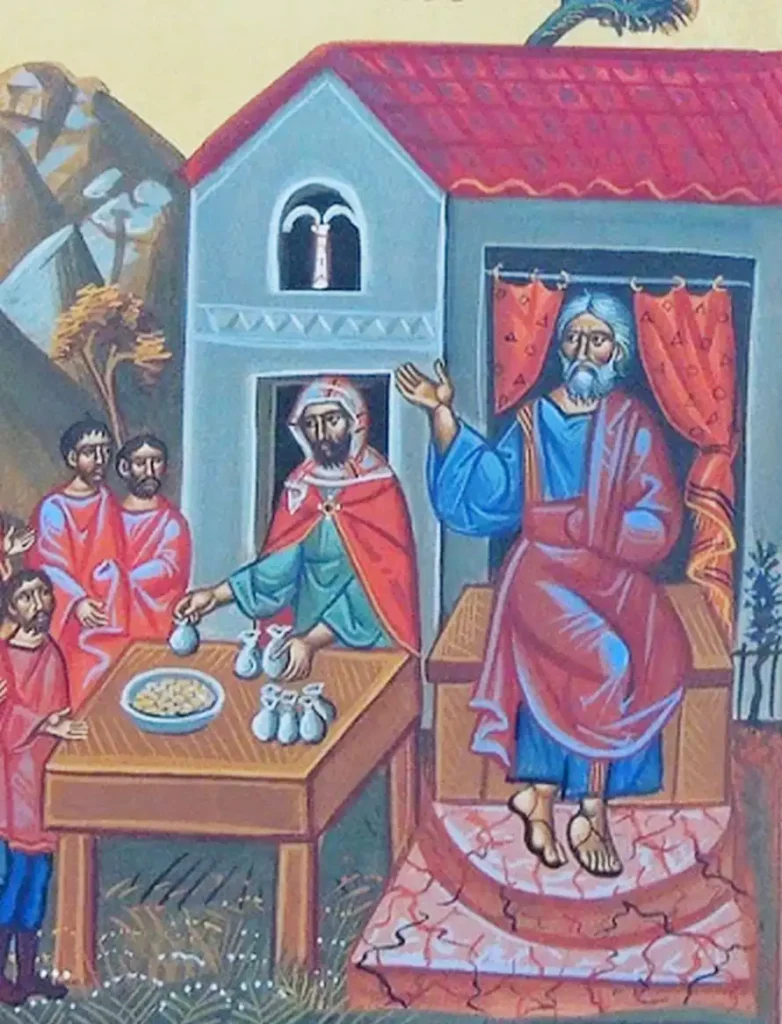Zebadiah | זְבַדְיָה (Hebrew) | Name
Etymology and Semantic Analysis of Zebadiah The name “Zebadiah” originates from the Hebrew word זְבַדְיָה (Z’vadyah), which means “Yahweh has bestowed” or “Gift of Yahweh.” This name is composed of two elements: זָבַד (zavad), meaning “to give,” and יָה (Yah), a shortened form of יְהוֹוָה (YHWH), the tetragrammaton, representing the name of God in the […]
The Parable of the Talents | 16th Sunday of Matthew

(Matthew 25:14-30) The parable of the talents in the Gospel of Matthew contains an important message about how we should view and use the abilities God grants us. As the story illustrates through the contrasting examples of the faithful and lazy servants, we have a duty to cultivate our talents rather than waste them selfishly. […]
Zacchur | זַכּוּר | Name
Etymology and Semantic Analysis The name “Zacchur” originates from the Hebrew word “זַכּוּר” (Zakkur), which is derived from the root “זָכַר” (zakar), meaning “to remember” or “to mention.” This name is indicative of remembrance, possibly implying “God has remembered.” In the context of the Biblical narrative, names often carry significant meanings that reflect the circumstances […]
Yell | צָעַק (Tsa’aq) | Verb
Etymology and Semantic Analysis The word ‘yell’ in English typically conveys a loud, often sharp cry, especially one that expresses pain or alarm. In the Hebrew Bible, the word often translated as ‘yell’ is צָעַק (Tsa’aq), a verb that carries a range of meanings primarily associated with crying out, calling aloud, or shouting, often in […]
Zabbud | זַבּוּד | Name
Etymology and Semantic Analysis The name ‘Zabbud’ originates from the Hebrew word זַבּוּד (Zabbud), which is a proper name. This name is mentioned in the Bible, specifically in the context of genealogies. In Hebrew, ‘Zabbud’ is likely associated with a root that connotes giving, presenting, or endowing, though the exact etymology is not clear. Its […]
Yarn | חוּט (Chut) | Noun
Etymology and Semantic Analysis The English word ‘yarn’ is synonymous with a long, continuous strand of interlocked fibers used for knitting or weaving. In the Bible, the Hebrew term חוּט (Chut) represents ‘yarn’ or ‘thread’. The word appears in a handful of Old Testament verses but is notably absent in the New Testament Greek texts. […]
Yoke | Ζυγός (zygos) | Noun
Etymology and Semantic Analysis The word ‘yoke’ in English is a direct translation of the Greek word ‘ζυγός’ (zygos), signifying an instrument used to join two animals, typically oxen, together for the purpose of plowing or pulling a load. This concept is present throughout the Bible, symbolizing a range of meanings from oppression and burden […]
Young | νέος (neos) | Adjective
Etymology and Semantic Analysis The English word ‘young’ traces back to the Old English ‘geong,’ signifying ‘youthful’ or ‘in the early part of life.’ In the New Testament, the Greek equivalent is ‘νέος’ (neos), primarily denoting ‘new’ or ‘young’ in age. This term appears in various contexts, shedding light on different aspects of youthfulness and […]
Yearn | ἐπιποθέω (epipotheó) – verb
Etymology and Semantic Analysis The English word “yearn” traces back to the Old English “georn” meaning “eager, craving, or desirous.” In the Bible, the Greek word ἐπιποθέω (epipotheó) conveys a similar meaning of intense longing or craving. This compound word combines epi meaning “focused on” and potheó meaning “to desire.” It expresses an emphatic, ongoing […]
Drink | πίνω (pino) | Verb
Etymology and Semantic Analysis The word ‘drink’ in English is derived from the Old English ‘drincan’, signifying the act of consuming a liquid. In the New Testament, the Greek verb πίνω (pino) is frequently used, encapsulating both the physical act of drinking and metaphorical interpretations. Notable occurrences of πίνω are found in various contexts, such […]
Dream | חֲלוֹם (Chalom) – Hebrew | ὄναρ (Onar) – Greek | Noun
Etymology and Semantic Analysis The English word ‘dream’ originates from the Old English ‘drēam,’ which historically meant joy or music but evolved to denote the images and emotions experienced during sleep. In the Hebrew Bible, ‘dream’ is primarily translated from חֲלוֹם (Chalom), while in the New Testament, the Greek term ὄναρ (Onar) is used. Dreams […]
Devil | Διάβολος: The Many Faces of Evil

The figure of “the Devil” appears in various forms throughout the Bible, from the talking serpent in Genesis to the dragon of Revelation. He is depicted as tempter, accuser, fallen angel, and personification of evil. This complex character has roots in ancient Jewish and early Christian texts and has evolved significantly over the centuries. While […]
Desolate in the Bible | ἔρημος (erēmos) | Adjective
Etymology and Semantic Analysis The word ‘desolate’ in English, conveying a sense of abandonment or emptiness, is often translated from the Greek word ‘ἔρημος’ (erēmos), an adjective found frequently in the New Testament. This Greek term carries connotations of solitude, barrenness, and isolation, painting pictures of uninhabited and desolate places or the emotional state of […]
Barabbas: The Man Who Escaped Death

In the Easter story, Pontius Pilate offered the mob a stark choice – condemn Jesus to crucifixion, or set free Barabbas, a convicted murderer and insurrectionist. To Pilate’s astonishment, they cried for Barabbas’ release over the innocent Christ. So as Jesus was led away to be executed in his place, Barabbas escaped the death he […]
Michael the Archangel: Heaven’s Supreme Commander

Humanity’s Protector: Saint Michael’s Aid to the Faithful Through History Saint Michael the Archangel, one of the principal angels and leader of heaven’s forces against darkness, has been revered since the earliest biblical times as humanity’s supreme advocate. Called upon countless times by the faithful in moments of strife, Saint Michael appears throughout both Old […]
Gabriel the Archangel: God’s Divine Messenger

The Messenger of Good News Born in Heaven, Gabriel is one of the archangels mentioned in the Bible. His name means “God is my strength.” As God’s special messenger, Gabriel visited the Virgin Mary and revealed that she would conceive and give birth to Jesus Christ, the son of God. This announcement is known as […]
Depart in the Bible | ἀπέρχομαι (Greek) | Verb
Etymology and Semantic Analysis The English word “depart” is derived from the Old French ‘departir’, meaning to divide or separate. In the Bible, its Greek counterpart is ἀπέρχομαι (apérchomai), a verb signifying to go away, leave, or depart. This word appears in several New Testament passages, reflecting various contexts. For instance, in Matthew 8:34, it […]
Biblical Fig | Biblical Lexicon | σῦκον (Greek)
Etymology and Semantic Analysis The English word ‘fig’ traces back to the Old English ‘fic’, which itself derives from the Latin ‘ficus’, signifying the fruit. In the Bible, the original Greek word used is σῦκον (sykon), a noun describing the fruit of the fig tree. This term appears in various contexts across both the New […]
Fifty in the Bible | πεντήκοντα (Greek: Pentekonta) | (Number)
Etymology and Semantic Analysis The English word ‘fifty’ is derived from the Old English ‘fīftig’, which is a compound of ‘fīf’ (five) and ‘tig’ (a group of ten). In the Biblical context, the Greek word ‘πεντήκοντα’ (pentekonta) is often used, signifying the numeral fifty. This word is found in various places within the New Testament. […]
Famine in the Bible | λιμός (Greek) | Noun
Definition The term ‘famine’ in the Bible primarily conveys a severe scarcity of food. In the original Greek, it is denoted as ‘λιμός’, a noun, reflecting a state of extreme hunger or food shortage. This word appears multiple times across the Biblical narrative, signifying both literal and metaphorical hunger. Commentary and Exegesis The concept of […]
Jacob (Israel) | Father of the twelve tribes of Israel

Jacob, also known as Israel, holds a pivotal position in the annals of religious history, renowned as the progenitor of the twelve tribes of Israel. His life, woven into the fabric of Judaic tradition, is a compelling narrative of faith, resilience, and divine interaction. Born in the 2nd millennium BCE, Jacob’s journey from a cunning […]
Fables | μῦθος (Greek) | Noun
Definition The English word “fables” refers to stories that are not based in fact, often used to teach a moral lesson. In a biblical context, these are tales or myths that may lead people away from the truth of the scripture. Various Translations In the King James Version (KJV), “fables” is the word of choice, […]
Genesis Translation

Genesis 1:1 At the dawn of time, God crafted the heavens and the earth. 1:2 The earth lay unformed and empty, with darkness shrouding the deep waters. The breath of God swept over these waters. 1:3 God commanded, “Let light be,” and light emerged. 1:4 Seeing the light was good, God separated it from the […]
Evangelical Church | Comprehensive Overview

The Evangelical Church represents a significant and diverse Christian movement, characterized by its emphasis on the teachings of the Gospel, personal faith, and the authority of the Bible. This term, deeply rooted in Christian theology, originates from the Greek word ‘euangelion’, meaning ‘good news’ or ‘gospel’. The etymological essence of the Evangelical Church lies in […]
Bible | Its Origins and Impact

The Bible stands as a cornerstone of religious and cultural history, encompassing a collection of texts revered in Christianity and Judaism. Etymologically, the term ‘Bible’ originates from the Greek ‘ta biblia’, meaning ‘the books’, signifying its nature as a compilation of various writings. Historically, the Bible’s formation spans centuries, with its earliest portions dating back […]
